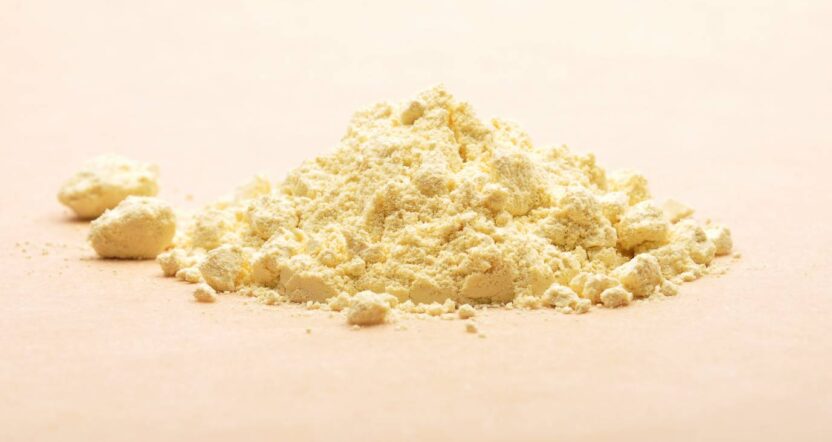What Is Lupin Flour?
Lupin flour is made from lupin beans, legumes related to peanuts.
Lupini beans are yellow seeds from the Lupinus plant typically enjoyed as a snack, often pickled, and have been a popular choice in the Mediterranean region, Latin America, and North Africa. Lupin beans, which have a bitter taste, are the foundation of lupin flour.
Despite being legumes, lupin beans differ from others because they contain minimal starch but boast high levels of protein (up to 40%) and fibre (up to 40%), plus a moderate fat content (8%) mainly comprising unsaturated fatty acids.
Lupin flour is simply lupin beans ground into a fine powder.
Lupin Flour Nutritional Facts
Here are the nutritional details for 30 grams (¼ cup) of Lupina Lupin Flour, sourced from Australian Sweet Lupin:
Calories: 100 kcal
Fat: 4 grams
Protein: 12 grams
Total Carbohydrates: 12 grams
Fibre: 11 grams
Net Carbs: 1 gram
Health Benefits of Lupin Flour
Lupin flour is rich in protein and fibre, gluten-free, and boasts a low glycemic index. Beyond macronutrients, lupin is packed with niacin (vit B3), copper, folate (vit B9), and thiamine (vitamin B1).
The substantial fibre content in lupin, reaching up to 40%, promotes digestive health. Studies indicate that a fibre-rich diet can reduce the risk of various health conditions, including heart disease, diabetes, obesity, stroke, and hypertension. Moreover, it aids in weight management by curbing appetite and enhancing gastrointestinal function.
Additionally, lupin’s protein content offers health benefits by aiding in the prevention of hypertension. Research suggests that protein extracts contribute to vascular wall repair.
Rich in antioxidants like carotenoids, lecithin, and tocopherols, lupin seeds combat oxidative stress caused by free radicals, preventing cellular damage.
Lupin Allergy
While lupin seeds and lupin flour are generally safe, individuals allergic to peanuts or legumes may experience allergic reactions to lupin. If you have such allergies, it is advisable to avoid lupin.
Lupin Flour and the Keto Diet
With 12 grams of total carbs, 11 of which are fibre, lupin flour only contains 1 gram of net carbs per 30 grams. Additionally, it is high in protein, gluten-free, and packed with vitamins, minerals, and antioxidants, making it a suitable choice for keto dieters.
Overall, lupin flour serves as a low-carb alternative to wheat flour, aiding in maintaining ketosis and offering numerous health benefits.
Unless you strictly avoid legumes on your keto plan, lupin flour is an excellent low-carb flour option for individuals on the keto diet or a low-carb regimen without legume allergies like peanuts.
Bottom Line: Yes, lupin flour is keto-friendly.
Net carbs in lupin flour: Lupin flour contains 1 gram of net carbs per 30-gram serving.
Food Ideas
Here are some quick examples of foods you can make with lupin flour:
Low-Carb Pizza Crust: Create a keto-friendly pizza base with a satisfying texture and real rise.
Sandwich Bread: Enjoy fluffy, low-carb bread for sandwiches or toast, perfect for staying within your carb goals.
Blueberry Muffins: Make moist, low-carb muffins with only about 3.5 net carbs per serving.
Banana Bread: Bake a protein- and fibre-rich banana bread, great for breakfast or snacks.
60-Second Microwave Bread: Whip up quick, keto bread in just a minute for sandwiches or toast.
Pancakes and Crêpes: Prepare fluffy, high-protein pancakes or thin crêpes for breakfast or brunch.
Waffles: Make light, low-carb waffles for a satisfying morning treat.
Almond Lupin Squares: Combine lupin flour with almonds and sweeteners for a gluten-free dessert bar.
These recipes highlight lupin flour’s versatility for both sweet and savoury low-carb dishes.
Conclusion
Lupin flour is a rising star in the keto community and stands out for its high protein and fibre content, moderate fat levels, and minimal carbs, distinguishing it from other legumes.
This makes it an excellent choice for keto or low-carb dieters without legume allergies.






